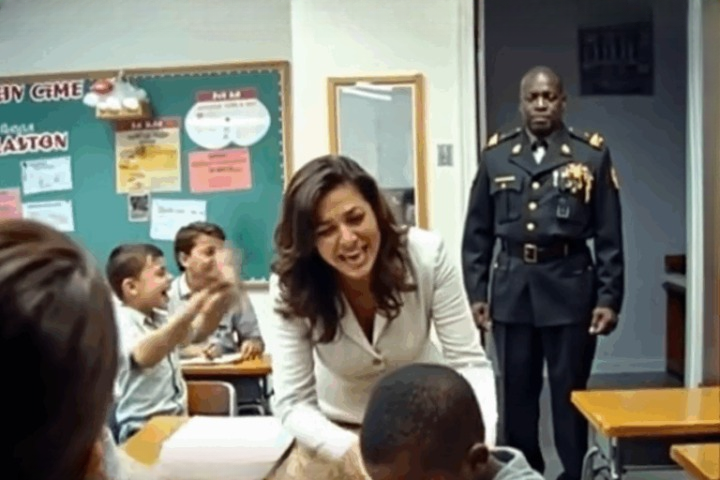The laughter began as a few quiet snickers in the back row — the kind that spread quickly, like a match dropped into dry grass. Soon the whole classroom was whispering, pointing, stifling smirks. Even the scrape of chairs sounded mocking. Ms. Halpern sighed, annoyed, but didn’t step in. It was just another morning, another round of teasing aimed at Daniel — the kid with patched pants, a fraying backpack, and a tendency to dream out loud.
Daniel sat perfectly still, cheeks burning. A few minutes earlier, he had made the mistake of sharing his “invention project,” something he’d been building with his parents at home. He’d spoken with genuine excitement, explaining how he wanted to create a device that harvested clean energy from motion.
The room thought it was comedy gold.
“Sure, dude,” someone snorted, “save the planet with duct tape.”
Even the teacher’s forced smile had stung. “Very imaginative, Daniel,” she’d said, voice gentle but patronizing. “But let’s stay focused on the assignment.”
That was when the classroom door opened.
A tall man stepped inside — jeans worn soft, work shirt faded, an old leather bag slung over his shoulder. He didn’t look intimidating, but he carried a quiet confidence that instantly shifted the room’s energy. The whispers died.
“Can I help you?” Ms. Halpern asked.
He nodded. “I’m Alex. Daniel’s uncle.” His tone was calm, but there was steel beneath it. “I was outside. I heard what was happening.”
A ripple moved through the room. Daniel froze, mortified, but Alex gave him a reassuring smile before turning to the class.
“I think,” Alex said evenly, “it’s time you all understood who you’re laughing at.”
Without waiting for permission, he stepped to the board, grabbed a stick of chalk, and began to draw. The scratching sound filled the room as complex shapes, lines, and angles slowly came together into something far more intricate than anyone expected.
“This,” he said, stepping aside, “is the renewable energy generator Daniel and I have been developing.”
The class fell silent. The diagram looked real — not a child’s fantasy, but a blueprint.
“It captures kinetic energy and converts it into usable electricity,” Alex explained. “A small unit could power a fan. A larger one, a small building.”
The teacher blinked. “This is… legitimate?”
“Absolutely,” Alex said.
He faced the students. “Daniel isn’t imagining things. He’s helped me test three prototypes. Some of his ideas — especially the one about magnetic resistance — actually made the design better.” His voice softened with pride. “And he’s only twelve.”
The mockers shrank in their seats.
Alex nodded to Daniel. “Show them the motion-trigger concept.”
Daniel hesitated, hands trembling, but his uncle’s steady gaze grounded him. He stepped forward and picked up the chalk.
“So… this part spins when you move,” he said quietly. “Like when you walk or bike. It builds energy and stores it in a battery. If we make it small enough…” He swallowed. “…you could charge your phone just by walking.”
He braced for laughter.
It never came.
“That’s actually… awesome,” one kid whispered.
Daniel’s eyes flicked up in surprise.
Ms. Halpern stepped forward, guilt clear on her face. “Daniel,” she said gently, “I owe you an apology. I shouldn’t have dismissed your idea.”
Alex smiled faintly. “Assumptions are easy. Seeing potential is harder.”
A student raised a hand. “So… your family are inventors?”
“We’re trying,” Alex replied. “Daniel’s parents are geniuses with recycled materials. They care about solving problems more than making money. Daniel got that from them.”
The students exchanged stunned looks. The narrative they had built about Daniel crumbled.
“Daniel,” Ms. Halpern said, “would you present your project at the science fair? I think the whole school needs to hear this.”
His eyes widened. “Me? Really?”
“Really,” she said. “And I’ll help you.”
Suddenly the room buzzed — not with jokes, but with genuine interest. Kids who had mocked him minutes earlier leaned in, asking questions about the generator, about energy storage, about whether they could help.
Alex stayed back, letting Daniel shine. Watching his nephew speak with passion and confidence, he felt a swell of quiet emotion. This was the same boy who once whispered, “Nobody cares about my ideas.”
Now they cared.
When the bell rang, no one bolted out the door. A few stayed to talk to Daniel. Even Ms. Halpern thanked Alex. “You reminded us,” she said, “that teaching is also about empathy.”
Alex nodded. “All he needed was a chance to be understood.”
As they walked down the hallway together, Daniel looked up. “Thanks for coming, Uncle Alex.”
Alex rested a hand on his shoulder. “You didn’t need me to prove yourself. I just opened the door. You walked through it.”
Outside, the afternoon sun warmed the sidewalk. Daniel’s classmates watched him leave — not the boy they mocked, but the boy who just might invent something extraordinary.
That night, Alex texted a photo of the chalkboard schematic to Daniel’s parents.
He added one line:
“He sees his own worth now.”
And that spark — that belief — was the invention that mattered most.
